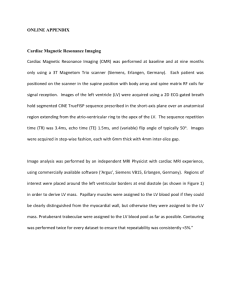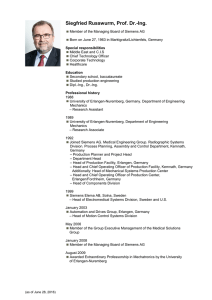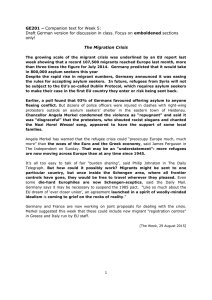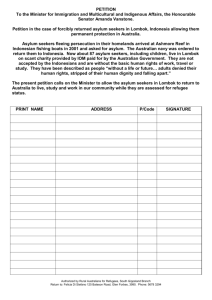Erlangen Case Study: Traineeships for
advertisement
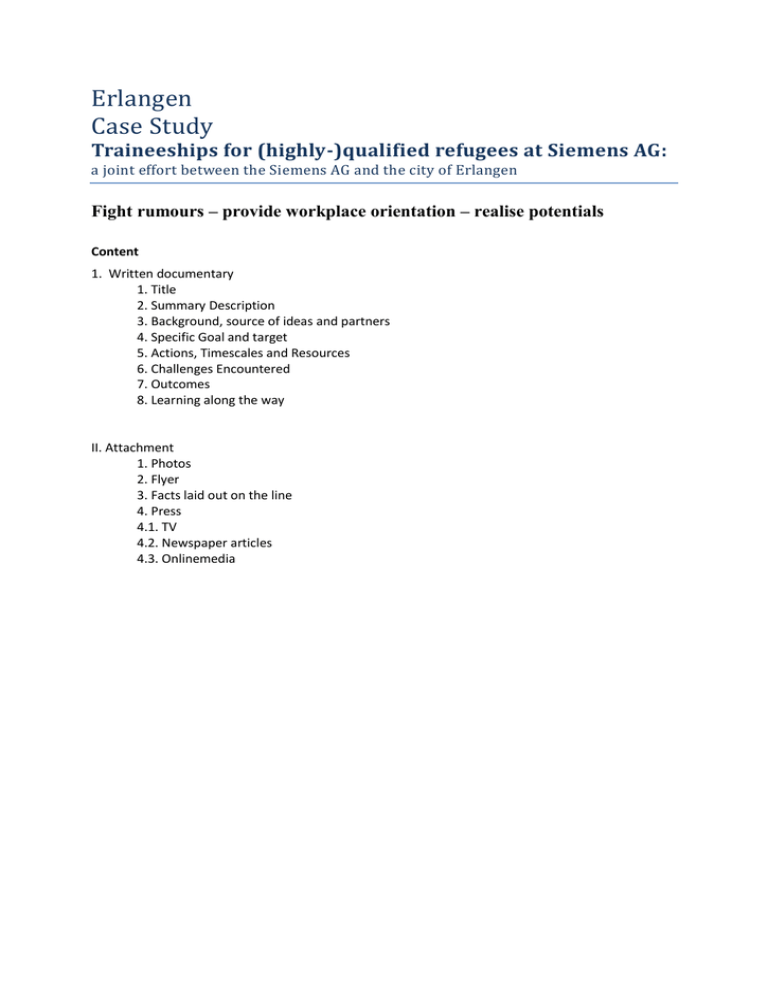
Erlangen Case Study Traineeships for (highly-)qualified refugees at Siemens AG: a joint effort between the Siemens AG and the city of Erlangen Fight rumours – provide workplace orientation – realise potentials Content 1. Written documentary 1. Title 2. Summary Description 3. Background, source of ideas and partners 4. Specific Goal and target 5. Actions, Timescales and Resources 6. Challenges Encountered 7. Outcomes 8. Learning along the way II. Attachment 1. Photos 2. Flyer 3. Facts laid out on the line 4. Press 4.1. TV 4.2. Newspaper articles 4.3. Onlinemedia 1. Title: Traineeships for (highly-)qualified refugees at Siemens AG: realizing potentials - a joint effort between the Siemens AG and the city of Erlangen As part of the C4I project - a joint action of the Council of Europe and the European Union- 11 selected cities, among them the city of Erlangen, seek to foster well-informed public debates on migration and diversity. The aim is to combat unfounded (but widespread) rumours and misconceptions about migrants. In the context of the EU-CoE joint project C4i, the city of Erlangen pursues a number of media campaigns and activities. The city of Erlangen and the Siemens AG have been closely cooperating in the endeavour to fight rumours against migrants and, in particular, against refugees. Together they launched several initiatives. One of these activities is a traineeship for (highly) qualified asylum seekers at Siemens. In the first quarter 2015, a closely monitored pilot programme was set-up to create structures for a robust, reproducible and successful internship programme for Asylum seekers at Siemens. Two asylum seekers took part in this first pilot. The programme structure is designed to be reproduced within Siemens Erlangen-Nuremberg, but also at other Siemens headquarters, namely Munich and Berlin, and serves as case-study for other companies in Erlangen and beyond. The post-pilot phase, during which the programme is consolidated and adapted as a more permanent programme for larger numbers of Asylum seeker-trainees, began in May 2015. 2. Background, source of ideas and partners Project background Political Background – refugee numbers rising Middle Franconia’s government obliged Erlangen on September 2014, in addition to the present refugees, to accommodate 300 new refugees on a week’s notice. These people were housed in tents – and prejudices about refugees gained new political pertinence in Erlangen. By May 2015, about 750 refugees were living in Erlangen, 400 of whom will stay throughout their Asylum process and, if asylum is granted , may make Erlangen their new home. Erlangen - refugee workforce integration as a historic success story Erlangen is a city with over 300 years history of integrating asylum seekers into the local workforce, and of appreciating the benefits of doing so thanks to the influx of know-how and skills. In 1686 Erlangen, at that time a city of about 500 citizens, welcomed around 1500 French refugees, the Huguenots, that soon turned Erlangen into an economic hub of innovation. The city prides itself with this history, reflected in the slogan “Erlangen - Offen aus Tradition” ( “Erlangen - openness is our tradition”). The company’s cooperation –social responsibility and diversity advantage The Siemens AG employs around 23,000 employees in the area today, nearly 25% of the Erlangen workforce. Siemens AG acknowledges the responsibility that comes with its impact on the urban social fabric, the company’s corporate social responsibility and a profound conviction of the diversity advantage and it cooperates closely with the city of Erlangen on C4i. Siemens AG empathises with the plight of refugees, as a global company that itself was a “refugee” having to move after the war from bombarded Berlin to Erlangen. Being a global company with customers around the world, and an international workforce, Siemens AG has a strong commitment to diversity management and fully embraces the diversity advantage. Source of ideas The Chamber of Industry and Commerce, supported by many private companies, calls for structural changes in Germany to allow for integration of asylum seekers into the workforce. While many asylum seekers arriving in Germany are (highly-) qualified, their potential is often overseen and barriers to applying their academic and professional knowledge and skills are often high. In fact, many Asylum seekers across Germany are forced into a life of inactivity, disconnected from German society and in practice barred from the German labour market. Although legal workplace regulations for asylum seekers have improved steadily over the last months, structural changes have been slow. In order to provide an opportunity for (highly-) qualified asylum seekers, the city of Erlangen offers orientationtraineeships, carried out by the Siemens AG. The aim is to counter rumours against refugees amongst employees, and thus a large part of the Erlangen inhabitants, by demonstrating their potential and increasing interaction, alongside providing orientation for refugees within the German labour market. Partners Partners, Sponsors and Volunteers The traineeship programme was developed jointly between the city of Erlangen and the Siemens AG. The city was integrated the project with the C4i general goals, by identifying (highly-) qualified refugees, mainly through the Asylum seeker advisors, and through establishing necessary bureaucratic structural changes jointly with the foreigner’s office, social unit, coordination unit for integration, and the employment bureau. Siemens AG provided support through the Siemens regional office of Erlangen/Nuremberg, HR and Employer Branding & Diversity. In additional, the C4i-trained anti-rumour agents (Fürsprecher für Vielfalt) supported the project throughout. Also, as part of the traineeship programme a ‘buddy programme’ with Siemens employees from the Divisions Digital Factory, Mobility and Healthcare, as well as cross-departmental units for Global Services and Human Resources that support the trainees one on one, was set-up. 4. Specific Goal and Target The overall aim was to promote the ICC core aim of the diversity advantage, and reduce rumours about refugees by showing their potential within the Siemens AG. The specific goals for the Asylum seekers are to: Support workplace integration and orientation of asylum seekers and allow for selfassessment of professional capacities Get to know company structure and culture of global, international company Foster societal participation and integration Offer professional opportunities for Asylum Seekers Built professional competencies and strengthen self-image Reduce rumours and (unconscious) prejudices within society (colleagues, other asylum seekers etc.) The specific goals for the employees are seen to be: Foster a culture of tolerance and acceptance Reduce rumours and (unconscious) prejudices against migrants Foster empathy and self-reflection Take on responsibility Strengthen culture of ownership Foster volunteering within company Foster commitment – company loyalty, belonging and strengthen overall company-employee ties. The specific goals for the company are to: Utilise the potential of (highly) qualified asylum seekers (diversity advantage) Counter a lack of highly skilled workforce in Germany Strengthen the positive image of company Take on societal and local responsibility: foster CSR Become a role model for other companies Pioneer as a trend-setter in society Contribute to a Diversity Strategy and Vision 2020 5. Actions, Timescales and Resources 1. Select Trainees • • • Cooperation with city of Erlangen: coordination integration and refugee counciling Hand in CV, application form (English or German), certificates, if applicable. Photo NOT needed 2. Select Team • • Forward Applications: HR DE CON to local HR units Identify suitable work units 3. Select Buddy • • Support EBD or local HR EBD or local HR clarifies and gives training about role, tasks and conditions of buddy 4. Get work permit and finalise work contract • • • • 4 weeks before traineeship start: Siemens fills in work permit application form -> asylum seeker seeks work permission via local city foreigners office (approval period: max 3 weeks) finalisation of work contract by local HR: approved by workers council clarify – apprentice reduction of lunch costs (50%) Send contract to trainee, copy EBD, forward to city of Erlangen) 5. Training Trainee and Buddy • • • 2 weeks before traineeship start: around 1,5 h First get-together training and buddy general information about Siemens and Diversity, unconscious bias training 6. Information Team • • • • • • 1-2 weeks before traineeship First get-together manager and trainee EBD or Diversity Agents (anti-rumour agents), or local HR, around 1 h Information about C4i, framework of traineeship Preconditions in team: direct responsible, E-Mail address, task plan traineeship project 7. Traineeship • 2 months 8. Workshop Team and Trainee • 1. Week of traineeship: EBD or Diversity Agents (anti-rumour agents), local HR around.1,5 h Get-together, intercultural communication, unconscious bias, teambuilding • 9. Support Team/Trainee/Budd y • • • regular contact, e.g. telephone or E-Mail, SSN contact person for all participants EBD, Diversity Agents (anti-rumour agents) or local HR 10. Feedback Team/Trainee/Budd y • • • last week of traineeship/ one week after traineeship Team feedback EBD, Diversity Agents (anti-rumour agents) oder local HR (For the timescale see Powerpoint Slide “Timescale” in Appendix) Throughout the traineeships Target group • • • • (highly) qualified Asylum seekers (do not live in first registration asylum camps (ZAEs) but already in local Asylum housing, with little/no professional experience at least 3 months in Germany language competencies: good command of English and basic knowledge German or very good command of German Soft Skills: stability to work on a regular basis, openness, high degree of motivation and interest Framework conditions • • • • Orientation-Traineeship for the duration of 2 months Costs are taken on by receiving work unit Costs for canteen equal to apprentice regulations individual work permit via foreigners office (city of Erlangen) Support Programme (Diversity) • • • • • • • Buddy System, Trainees are acompanied by Buddy Introduction Trainee and Buddy Introduction Team (work unit) intercultural team workshop regular exchange and final feedback team, trainee, buddy Coordination of Diversity Agents/ anti rumour agents Additional workpackage for trainees, including in-house trainings Stakeholders • City of Erlangen: Coordination Integration, local refugee organisations and refugee support agency Employer Branding & Diversity, Siemens AG locale HR unit, Siemens AG CG, Siemens AG Site Manager, Siemens AG receiving Siemens work unit Diversity Agents/Anti rumour agents • • • • • • 6. Challenges Encountered Challenges included creating a programme that is outside previous regulations and structures and had to be built from scratch, including bureaucratic structures and cross-departmental knowledge sharing and cooperation in the field of asylum seeker employment, company processes, and a strong framework programme for the traineeships. 7. Outcomes Short and long-term outcomes include: Reduction in rumours about refugees amongst Siemens employees Fostering of Intercultural exchange Fostering of Intercultural awareness and competences from both sides Awareness and use of the Diversity Advantage Exchange of know-how and knowledge Improvement of workplace capacity of Asylum seekers Strong contribution to long term intercultural integration 8. Learning along the way Lessons learned: 1. Importance of timely identification y and integration of the diverse units that will be involved, to make it “their project” 2. Companies can be a strong support for local integration efforts 3. Companies value the diversity advantage and can be great partners for intercultural integration projects 4. The buddy programme proved to be extremely useful and important both for the receiving units and the Asylum seekers 5. It is important to create a work-plan for the traineeships, so the Asylum seekers (or anyone involved) can proof and contribute their skills Attachment Powerpoint
